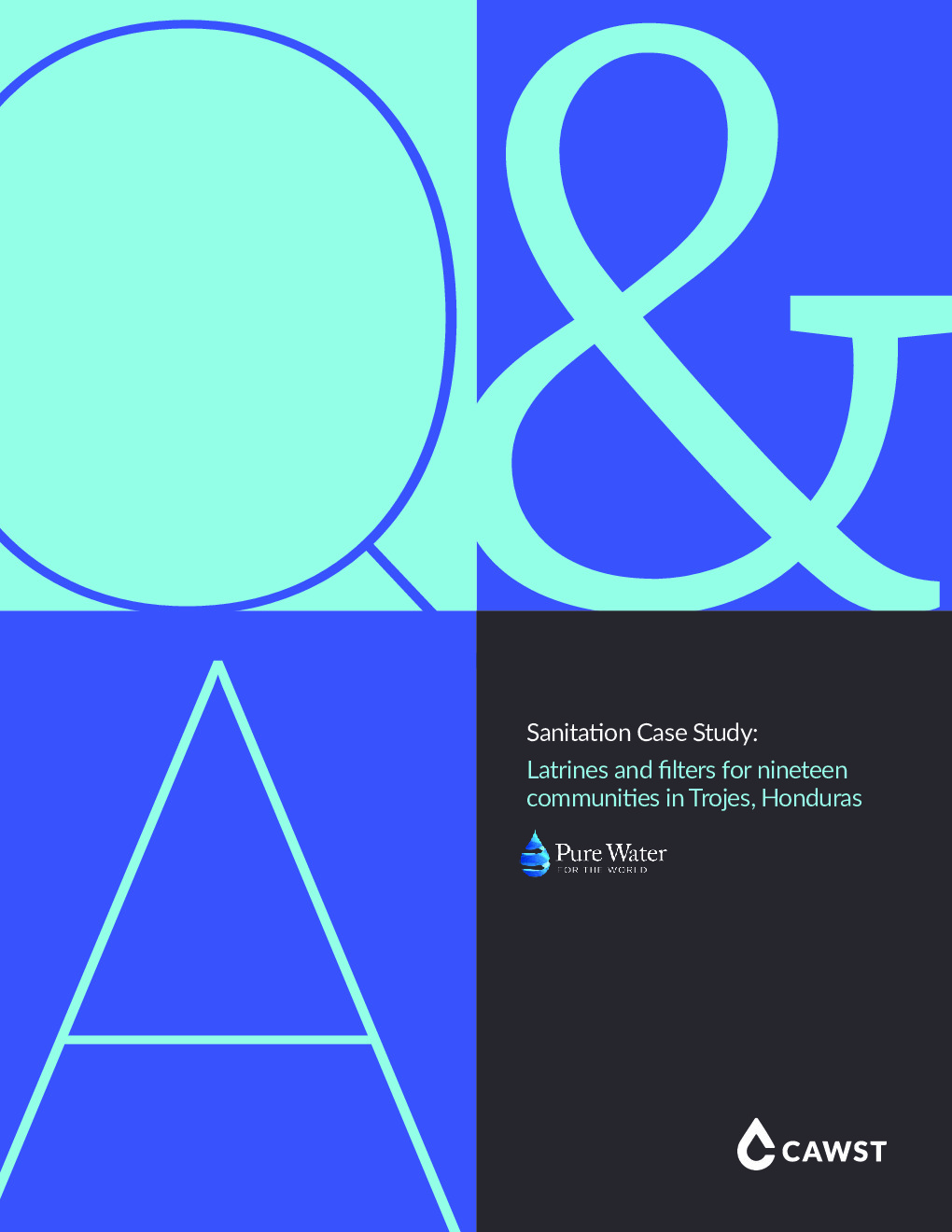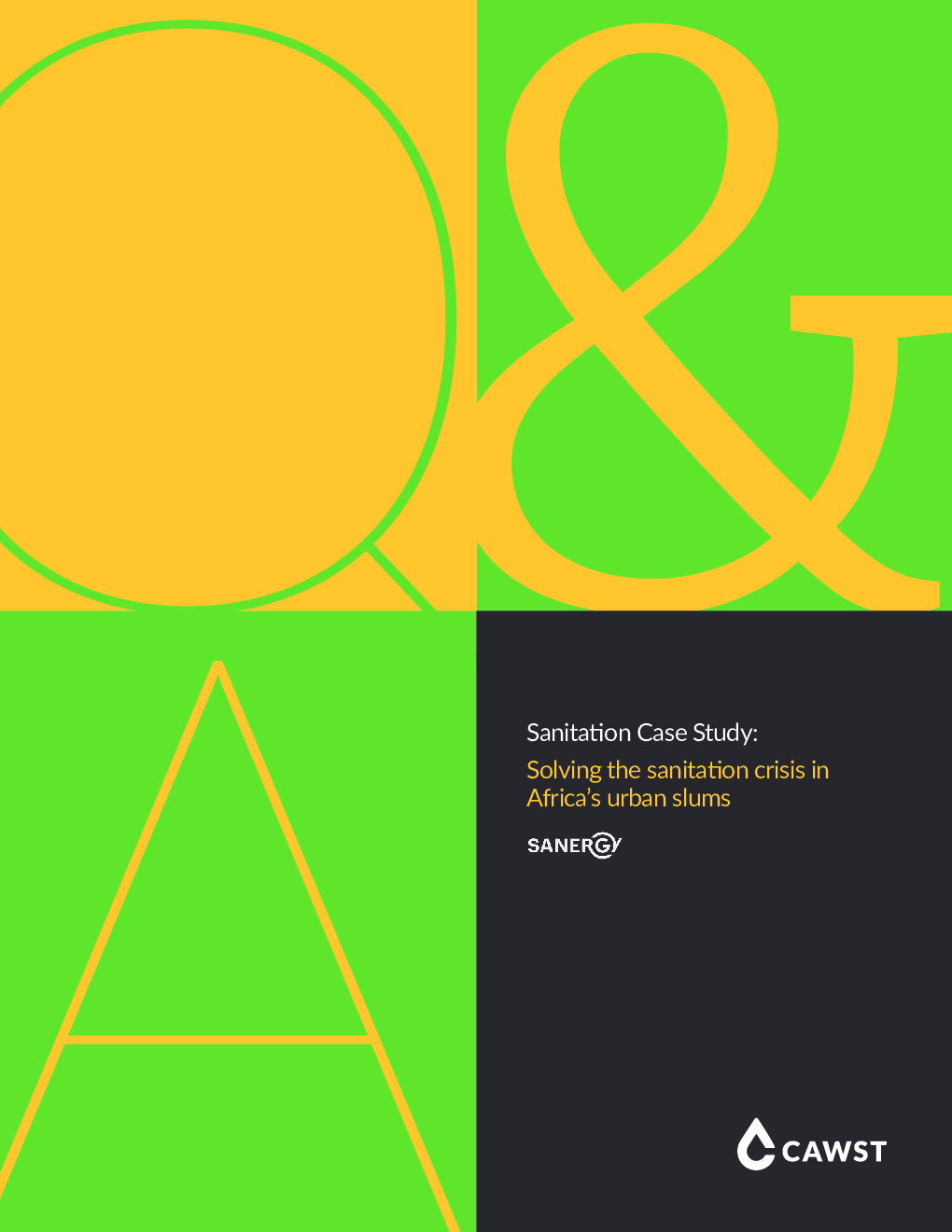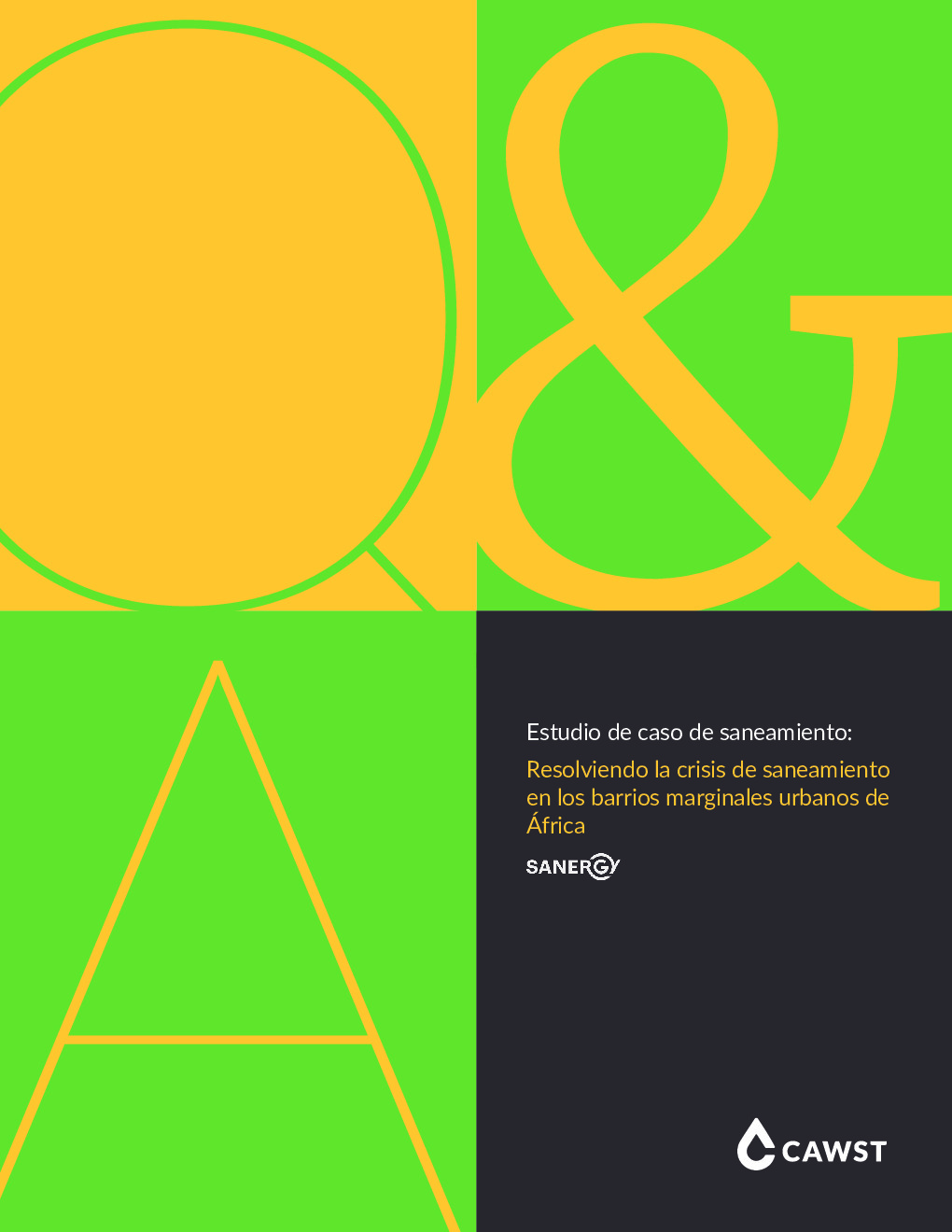-
Containment Collection and transport Treatment Disposal / Reuse
-
Capacity building Finance Information Education and Communication / Behavior Change Communication Infrastructure Policy and processes Technology
-
Access to sanitary toilets Better governance and planning Change in disease burden Collection efficiency of sanitation system Cost recovery Environmental sustainability through reuse, resource recovery, conservation Equity and social inclusion Private sector engagement Quantity of waste safely treated Sanitation practices of the supply side Sanitation practices of the end user
-
MEDS Convening 2018 - Conversations about Sanitation, SDGs and Research
The Measurement, Evidence, and Dissemination, for Scale (MEDS) initiative was created by merging the Measurement, Learning and Evaluation (MLE) initiative with the Building Demand for Sanitation (BDS) initiative at the end of 2015. The 2017 MEDS Convening was the 2nd convening under MEDS but the 6th annual meeting for many of the participants, formally convening under the BDS portfolio.In 2017, the MEDS grantees convened in Patna, the capital of the 3rd largest Indian State of Bihar. The sanitation challenge in India is unique in its scale and nature for a nation state. Out of the 829 million people in the world who defecate in the open, 524 million reside in India. Regionally, India accounts for 90 per cent of the people in South Asia who defecate outside. Open defecation is still almost universal among the poorest 20 per cent of the population. The populous and northern state of Bihar is considered one of the least developed Indian States. 54% of the population lie below the poverty line. It has a history of political instability and low government investment. Less than a third of households in rural Bihar have access to a toilet and 12% of India’s open defecation burden lies in Bihar.This report is structured into 5 sections. The introduction presents the convening aims and format with a brief overview of our host location Patna in Bihar State, India. The second section provides a quick overview of the current and recently completed MEDS portfolio projects, and their overall focus. Section three is dedicated to the convening activities themselves, where we have kept some granular detail of the exchanges, discussions and observations which took place during the convening. This section may useful as an aide memoire for participants. Section four focuses on learning and reflection which is a core part of the MEDS convenings. Much of the content here is provided by convening participants either through thematic commentators or plenary reflection. It gives some insight into the collective learning and reflection by the end of the week rather than a position of any one person, or organization. Section five concludes this report.
-
ODF+, ODF++ and Sustainability of Sanitation - Thematic Discussion Series Synthesis
The responses provided a canvas of problems with sustaining ODF that covers technical, behavioural and physical issues. These issues, persistent since before SBM, must be overcome before India could move onto ODF+, ODF++ and ODF-S. All the issues were related to the ODF-centric approach of SBM that focussed only on toilet coverage.The technical problems concerned the quality of construction and types of toilets. Twin leach pit latrines were useful in most parts of India except in waterlogged areas. Here, members said, beneficiaries must be provided with different types of toilets so the pits did not fill with water or contaminate groundwater. The ‘acceptable’ superstructure was suffocating; people would be willing to use toilets if they were combined with bathrooms. Behavioural issues, members enumerated, concerned the social norms around open defecation. While triggering through community-led approaches prompted a flurry of construction activity, there was need to keep the spotlight on sanitation and hygiene after all househods built toilets. This could be achieved by appointing a swacchagrahi in each village who was paid an incentive for specific outcomes. In the post-construction phase, aspirations messages should emphasise the benefits of using toilets rather than berating people for defecating in the open. Some suggested separate toilets for men and women.Physical issues concerned the lack of water and poor placement of toilets. The government should ensure ODF villages had a reliable water supply, said members.The health sector, notably those working on HIV-AIDS, had run a long and successful campaign to change behaviour and spread awareness about unsafe sex. Members said this should be beacon for sanitation that a long, sustained and cross-media campaign would be needed along with construction to ensure the sustainability of ODF. ODF+ and later stages could be folded into this media campaign.They brought up the issue handling faecal sludge. Single-pit toilets would fill up in a few years after which the family could resort to open defecation until they could make another pit or find a way of emptying their pit. Mechanical desludgers were an option, but the sludge needed to be transported and recycled safely. This led to the issue of sanitation workers and manual scavenging. While banned under the 2013 Act, municipalities and panchayats simply denied their existence. This made it impossible to develop any local plans for re-emplying manual scavengers by training them. Members suggested without data on their numbers and type (regular municipal employees, contract workers or ad hoc employees) it was difficult to develop skilling curricula. A multi-stakeholder approach was needed, suggested members. This would involve NGOs, CSOs, youth groups, the government, private sector, and others working together to sustain ODF, address issues of sanitation workers while progressing towards ODF++ or ODF-S.
-
Our bets are on co-processing of fecal sludge and municipal solid waste as the next important trend in urban sanitation
Liquid and solid waste management are huge and unsolved challenges in many developing cities. Thisarticle makes the case that co-processing FS and MSW could help: 1) Tackle the publicand environmental health disasters associated with inadequate urban wastemanagement; and 2) Improve the operating economics of FS management.
-
Preparing to be Unprepared - Decision Making and the Use of Guidance on Sanitation Systems and Faecal Sludge Management in the First Phase of Rapid-On...
This research aims to contribute a small part towards larger efforts building credible evidence and increasing understanding of the current proven solutions in the emergency context through two components. The first component aims to investigate and compile what options have been proven for applications in the emergency context. The second component aims to understand what are the driving forces behind the decisions made on faecal sludge disposal in first phase emergencies at the field level.This guidance is intended to support humanitarian practitioners in site selection and establishment, as well as associated risk mitigation. The challenge has two components: 1) research; and 2) dissemination.
-
Promotion of SFDs: Review of Phase 1 Report
This document represents a review report of the experience gained from producing SFDs from GIZ, WEDC, UoL, CSE and Eawag under the of the Phase I of the “Promotion of Shit Flow Diagrams” project funded by the Bill & Melinda Gates Foundation.This report results from collating inputs from all partners on the use of the manual for SFD production, the SFD calculation tool, key learning points and experiences gained during the process of producing SFDs.
-
PWW in Honduras Sanitation Case Study
CAWST’s Sanitation Case Studies give detailed overviews of different latrine programs. Each case study describes how the implementer(s) addressed seven components of latrine programs, and what challenges they have faced.
-
PWW in Honduras Sanitation Case Study
CAWST’s Sanitation Case Studies give detailed overviews of different latrine programs. Each case study describes how the implementer(s) addressed seven components of latrine programs, and what challenges they have faced.
-
PWW in Honduras Sanitation Case Study
CAWST’s Sanitation Case Studies give detailed overviews of different latrine programs. Each case study describes how the implementer(s) addressed seven components of latrine programs, and what challenges they have faced.
-
Sanergy in Kenya Sanitation Case Study
CAWST’s Sanitation Case Studies give detailed overviews of different latrine programs. Each case study describes how the implementer(s) addressed seven components of latrine programs, and what challenges they have faced. Each case study is in a “Question and Answer” format.
-
Sanergy in Kenya Sanitation Case Study
CAWST’s Sanitation Case Studies give detailed overviews of different latrine programs. Each case study describes how the implementer(s) addressed seven components of latrine programs, and what challenges they have faced. Each case study is in a “Question and Answer” format.
-
Sanergy in Kenya Sanitation Case Study
CAWST’s Sanitation Case Studies give detailed overviews of different latrine programs. Each case study describes how the implementer(s) addressed seven components of latrine programs, and what challenges they have faced. Each case study is in a “Question and Answer” format.
-
Sanitation for Millions – Uganda - Sustainable sanitation: A contribution to peaceful co-existence and sustainable livelihoods for refugees and host c...
According to the World Bank (2017), Uganda incurs a loss of about 177 Million USD annually because of a lack of appropriate sanitation. Especially in Uganda’s capital Kampala, the negative impacts on health and privacy are extremely problematic. More than 90% of the city’s population depends on decentralized sanitation, which is usually inappropriate and unhygienic. The situation in informal settlements is especially difficult, as they face a constant increase of migrants and refugees. According to the United Nations Refugee Agency (UNHCR) and World Bank reports, Uganda accepted about 1.25 Millions of refugees until May 2017, of which about 900,000 originate from South Sudan, and about 94,000 live in Kampala. Approximately 70% of the refugees are women and children. The supply with basic amenities and the maintenance of adequate hygiene conditions is a huge challenge for the host communities. There is high demand for improvements of sanitation services at public institutions such as schools. Furthermore, the services along the sanitation chain are currently inadequate and insufficient, neither fully regulated nor controlled.
-
Sanitation for Millions – Uganda - Sustainable sanitation: A contribution to peaceful co-existence and sustainable livelihoods for refugees and host c...
According to the World Bank (2017), Uganda incurs a loss of about 177 Million USD annually because of a lack of appropriate sanitation. Especially in Uganda’s capital Kampala, the negative impacts on health and privacy are extremely problematic. More than 90% of the city’s population depends on decentralized sanitation, which is usually inappropriate and unhygienic. The situation in informal settlements is especially difficult, as they face a constant increase of migrants and refugees. According to the United Nations Refugee Agency (UNHCR) and World Bank reports, Uganda accepted about 1.25 Millions of refugees until May 2017, of which about 900,000 originate from South Sudan, and about 94,000 live in Kampala. Approximately 70% of the refugees are women and children. The supply with basic amenities and the maintenance of adequate hygiene conditions is a huge challenge for the host communities. There is high demand for improvements of sanitation services at public institutions such as schools. Furthermore, the services along the sanitation chain are currently inadequate and insufficient, neither fully regulated nor controlled.
-
Scaling City Institutions for India: Sanitation - Updates from SCI-FI project
This library entry contains several documents produced by the SCI-FI project which wa led by Shubhagato Dasgupta and funded by the Bill & Melinda Gates Foundation. Name of lead organization: Centre for Policy ResearchPrimary contact at lead organization: Shubhagato Dasgupta, Senior FellowGrantee location: New Delhi, IndiaDeveloping country where the research is being carried out: IndiaStart and end date: Phase 1: 14.11.2012 to 30.11.2015, Phase 2: 09.11.2015 to 31.12.2018The following documents are available for download below:- Presentation on evolution of sanitation policies and programs in India, FSM3 Conference in Hanoi (January 2015)- Manual Cleaning of Sewers and Septic tanks (September 2017)Content: In December 2013, the Prohibition of Employment as Manual Scavengers and their Rehabilitation Act (“the Act”) was notified by the Central Government. The Act is a Parliamentary law, binding on all states. While an earlier 1993 law prohibited the employment of manual scavengers and construction of dry latrines, the strength of the new Act is that it brings hazardous cleaning of sewers and septic tanks under its ambit. This brief focuses on the legal environment for manual cleaning of sewers and septic tanks, a practice that has led to many deaths, most recently in Delhi, the national capital. Drawing on the Act and associated Rules, it examines the existing legal framework, and poses the following questions:What are the circumstances in which manual cleaning of sewers and septic tanks is permissible?How is manual cleaning of sewers and septic tanks to be carried out safely?What are the penal consequences of hazardous cleaning of sewers and septic tanks?Who is responsible for enforcement of the Act?++++++++Further documents (download links are further down below):- Why Sanitation Policy Needs to Look Past Toilets (September 2017)- Capacity Building Needs Assessment of Cities (Angul and Dhenkanal) and State Government on Sanitation (March 2017)- Redefining Universal Sanitation a Gender Perspective (May 2018)
-
Scaling City Institutions for India: Sanitation - Updates from SCI-FI project
This library entry contains several documents produced by the SCI-FI project which wa led by Shubhagato Dasgupta and funded by the Bill & Melinda Gates Foundation. Name of lead organization: Centre for Policy ResearchPrimary contact at lead organization: Shubhagato Dasgupta, Senior FellowGrantee location: New Delhi, IndiaDeveloping country where the research is being carried out: IndiaStart and end date: Phase 1: 14.11.2012 to 30.11.2015, Phase 2: 09.11.2015 to 31.12.2018The following documents are available for download below:- Presentation on evolution of sanitation policies and programs in India, FSM3 Conference in Hanoi (January 2015)- Manual Cleaning of Sewers and Septic tanks (September 2017)Content: In December 2013, the Prohibition of Employment as Manual Scavengers and their Rehabilitation Act (“the Act”) was notified by the Central Government. The Act is a Parliamentary law, binding on all states. While an earlier 1993 law prohibited the employment of manual scavengers and construction of dry latrines, the strength of the new Act is that it brings hazardous cleaning of sewers and septic tanks under its ambit. This brief focuses on the legal environment for manual cleaning of sewers and septic tanks, a practice that has led to many deaths, most recently in Delhi, the national capital. Drawing on the Act and associated Rules, it examines the existing legal framework, and poses the following questions:What are the circumstances in which manual cleaning of sewers and septic tanks is permissible?How is manual cleaning of sewers and septic tanks to be carried out safely?What are the penal consequences of hazardous cleaning of sewers and septic tanks?Who is responsible for enforcement of the Act?++++++++Further documents (download links are further down below):- Why Sanitation Policy Needs to Look Past Toilets (September 2017)- Capacity Building Needs Assessment of Cities (Angul and Dhenkanal) and State Government on Sanitation (March 2017)- Redefining Universal Sanitation a Gender Perspective (May 2018)















